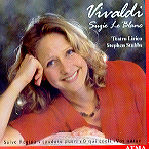This is one of those good news, bad news situations. The good news is that this singer and record label are plowing the fertile yet relatively untouched fields of Baroque solo vocal repertoire–specifically the works of Vivaldi, who wrote dozens of pieces in the genre. Yes, there’s a similarity to it and yet, as with most of Vivaldi’s music, in each piece some nifty idea inevitably comes along–usually rhythmic or melodic or both–that grabs you, stays with you, or just makes you feel better for having heard it. There are many such moments in these four motets (two of which might more properly be called cantatas). O qui coeli contains one of Vivaldi’s catchier “alleluias”, a quick little flourish certainly devised to challenge the singer and impress the listener; in the Salve Regina, the final movement, “Et Jesum”, is one of the sweetest and gentlest of Vivaldi melodies–and is one of the few instances where soprano Suzie Le Blanc really finds the heart of the music. She similarly captures the mysterious mood and conquers the tricky ornaments of “Sit nomen Domini” of the Laudate pueri. Now for the bad news: Although Le Blanc’s voice is agile and she is a capable and technically accomplished (and very experienced) singer, her voice here lacks warmth and depth, and the persistent straightness of her tone wears on the ear after the first 10 minutes. This is not a voice to carry a whole program by itself–at least in this repertoire. As mentioned above, she has her shining moments–an indication of possibilities–and she has done good work on other recordings with other performers; but in such soloist-centered music it would take a voice with more color and expressive range (Dorothea Röschmann comes to mind) to hold this listener’s ear, let alone demand a repeat performance.
































